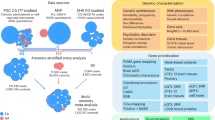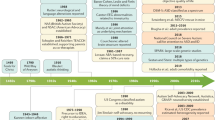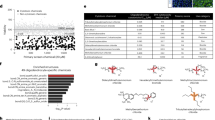Abstract
With the advent of the sustainable development goals, the field of global child health has shifted its focus from reducing mortality to improving health, nutrition and development outcomes — often measured as human capital. A growing knowledge of the biology of development and neuroscience has highlighted the importance of adverse environmental exposures, collectively termed adverse childhood experiences (ACEs) on health outcomes. ACEs are associated with short-term, medium-term and long-term negative consequences for health and development and their effects may be multiplicative, especially during critical periods of sensitivity and developmental plasticity. Some of these effects are compounded by emerging global threats such as climate change, conflict and population displacement. In this Review, we discuss the key mechanisms linking ACEs to health outcomes and consider promising strategies to prevent and mitigate their effects, highlighting evidence from programs in low-income and middle-income countries. Finally, we emphasize the need for early recognition of ACEs and delivery of packages of interventions spanning key sectors such as health, education, women’s empowerment and social protection.
This is a preview of subscription content, access via your institution
Access options
Access Nature and 54 other Nature Portfolio journals
Get Nature+, our best-value online-access subscription
$29.99 / 30 days
cancel any time
Subscribe to this journal
Receive 12 print issues and online access
$209.00 per year
only $17.42 per issue
Buy this article
- Purchase on Springer Link
- Instant access to full article PDF
Prices may be subject to local taxes which are calculated during checkout


Similar content being viewed by others
References
Gilgoff, R., Singh, L., Koita, K., Gentile, B. & Marques, S. S. Adverse childhood experiences, outcomes, and interventions. Pediatr. Clin. North Am. 67, 259–273 (2020).
Lopez, M. et al. The social ecology of childhood and early life adversity. Pediatr. Res. 89, 353–367 (2021).
Barrero-Castillero, A. et al. Perinatal and early childhood biomarkers of psychosocial stress and adverse experiences. Pediatr. Res. 92, 956–965 (2022).
Kraaijenvanger, E. J. et al. Impact of early life adversities on human brain functioning: a coordinate-based meta-analysis. Neurosci. Biobehav. Rev. 113, 62–76 (2020).
Dickman, K. D., Votruba-Drzal, E., Matthews, K. A. & Kamarck, T. W. Early Life SES, Childhood trauma exposures, and cardiovascular responses to daily life stressors in middle-aged adults. Int. J. Behav. Med. https://doi.org/10.1007/s12529-022-10141-2 (2022).
Seal, S. V. & Turner, J. D. The ‘Jekyll and Hyde’ of gluconeogenesis: early life adversity, later life stress, and metabolic disturbances. Int. J. Mol. Sci. 22, 3344 (2021).
Burke, N. N., Finn, D. P., McGuire, B. E. & Roche, M. Psychological stress in early life as a predisposing factor for the development of chronic pain: clinical and preclinical evidence and neurobiological mechanisms. J. Neurosci. Res. 95, 1257–1270 (2017).
Sheridan, M. A. et al. Early deprivation alters structural brain development from middle childhood to adolescence. Sci. Adv. 8, eabn4316 (2022).
Sumner, J. A. et al. Stressful life events and accelerated biological aging over time in youths. Psychoneuroendocrinology https://doi.org/10.1016/j.psyneuen.2023.106058 (2023).
Logan-Greene, P., Bishop, A. S., Kim, B. E. & Nurius, P. S. Protective factors against aggression and antisocial attitudes among probation youth with childhood adversity histories. Prev. Sci. https://doi.org/10.1007/s11121-022-01472-3 (2022).
Békés, V., Starrs, C. J. & Perry, J. C. The COVID-19 pandemic as traumatic stressor: distress in older adults is predicted by childhood trauma and mitigated by defensive functioning. Psychol. Trauma https://doi.org/10.1037/tra0001253 (2022).
Black, M. M., Pérez-Escamilla, R. & Rao, S. F. Integrating nutrition and child development interventions: scientific basis, evidence of impact, and implementation considerations. Adv. Nutr. 6, 852–859 (2015).
Kataria, Y., Gaewsky, L. & Ellervik, C. Prenatal smoking exposure and cardio-metabolic risk factors in adulthood: a general population study and a meta-analysis. Int. J. Obes. 43, 763–773 (2019).
Marshall, A. T. et al. The impact of prenatal alcohol and/or tobacco exposure on brain structure in a large sample of children from a South African birth cohort. Alcohol Clin. Exp. Res. 46, 1980–1992 (2022).
Barker, D. J. The origins of the developmental origins theory. J. Intern. Med. 261, 412–417 (2007).
Gluckman, P. D., Hanson, M. A. & Buklijas, T. A conceptual framework for the developmental origins of health and disease. J. Dev. Orig. Health Dis. 1, 6–18 (2010).
Laricchiuta, D. et al.The body keeps the score: the neurobiological profile of traumatized adolescents. Neurosci. Biobehav. Rev. https://doi.org/10.1016/j.neubiorev.2023.105033 (2023).
United Nations Children’s Fund. ‘A Familiar Face: violence in the lives of children and adolescents’. https://data.unicef.org/resources/a-familiar-face/(UNICEF, New York, 2017).
Sójta, K. & Strzelecki, D. Early maladaptive schemas and their impact on parenting: do dysfunctional schemas pass generationally?—a systematic review. J. Clin. Med. 12, 1263 (2023).
Rogawski, E. T. et al. MAL-ED Network Investigators. Use of quantitative molecular diagnostic methods to investigate the effect of enteropathogen infections on linear growth in children in low-resource settings: longitudinal analysis of results from the MAL-ED cohort study. Lancet Glob. Health 6, e1319–e1328 (2018).
Ramírez Ortega, D. et al. Cognitive impairment induced by lead exposure during lifespan: mechanisms of lead neurotoxicity. Toxics 9, 23 (2021).
Frounfelker, R. L. et al. Mental health of refugee children and youth: epidemiology, interventions, and future directions. Annu. Rev. Public Health 41, 159–176 (2020).
Alleyne-Green, B., Kulick, A., Grocher, K. & Betancourt, T. S. Physical and sexual violence experienced by male war-affected youth: implications for post-conflict functioning and intimate relationships. J. Interpers. Violence 36, NP4874–NP4890 (2021).
Jensen, S. K. G., Berens, A. E. & Nelson, C. A. 3rd Effects of poverty on interacting biological systems underlying child development. Lancet Child Adolesc. Health 1, 225–239 (2017).
Estrin, G. L. & Bhavnani, S. Brain Development: Structure. In Encyclopedia of Infant and Early Childhood Development 2nd edn, Vol. 1 (ed. Benson, J. B.) 205–214 (Elsevier, 2020).
Kwon, D., Pfefferbaum, A., Sullivan, E. V. & Pohl, K. M. Regional growth trajectories of cortical myelination in adolescents and young adults: longitudinal validation and functional correlates. Brain Imaging Behav. 14, 242–266 (2020).
Sawyer, S. M. et al. Adolescence: a foundation for future health. Lancet 379, 1630–1640 (2012).
Patel, V. Acting early: the key to preventing mental health problems. J. R. Soc. Med. 111, 153–157 (2018).
Bhopal, S. et al. The contribution of childhood adversity to cortisol measures of early life stress amongst infants in rural India: findings from the early life stress sub-study of the SPRING cluster randomised controlled trial (SPRING-ELS). Psychoneuroendocrinology 107, 241–250 (2019).
Koss, K. J. & Gunnar, M. R. Annual research review: early adversity, the hypothalamic–pituitary–adrenocortical axis, and child psychopathology. J. Child Psychol. Psychiatry 59, 327–346 (2018).
Murphy, F. et al. Childhood trauma, the HPA axis and psychiatric illnesses: a targeted literature synthesis. Front. Psychiatry 13, 748372 (2022).
Kuhlman, K. R., Horn, S. R., Chiang, J. J. & Bower, J. E. Early life adversity exposure and circulating markers of inflammation in children and adolescents: a systematic review and meta-analysis. Brain Behav. Immun. 86, 30–42 (2020).
Isolauri, E., Rautava, S., Salminen, S. & Collado, M. C. Early-life nutrition and microbiome development. Nestle Nutr. Inst. Workshop Ser. 90, 151–162 (2019).
Hantsoo, L. & Zemel, B. S. Stress gets into the belly: early life stress and the gut microbiome. Behav. Brain Res. 414, 113474 (2021).
Pinhasov, A. & Kirby, M. Linking stress and inflammation—is there a missing piece in the puzzle? Expert Rev. Clin. Immunol. 18, 321–323 (2022).
Colich, N. L., Rosen, M. L., Williams, E. S. & McLaughlin, K. A. Biological aging in childhood and adolescence following experiences of threat and deprivation: a systematic review and meta-analysis. Psychol. Bull. 146, 721–764 (2020).
Ridout, K. K. et al. Early life adversity and telomere length: a meta-analysis. Mol. Psychiatry 23, 858–871 (2018).
Soares, S., Rocha, V., Kelly-Irving, M., Stringhini, S. & Fraga, S. Adverse childhood events and health biomarkers: a systematic review. Front. Public Health 9, 649825 (2021).
Jones, C. W. et al. The transgenerational transmission of maternal adverse childhood experiences (ACEs): insights from placental aging and infant autonomic nervous system reactivity. Psychoneuroendocrinology 106, 20–27 (2019).
Strüber, N., Strüber, D. & Roth, G. Impact of early adversity on glucocorticoid regulation and later mental disorders. Neurosci. Biobehav. Rev. 38, 17–37 (2014).
Dumornay, N. M., Lebois, L. A. M., Ressler, K. J. & Harnett, N. G. Racial disparities in adversity during childhood and the false appearance of race-related differences in brain structure. Am. J. Psychiatry 180, 127–138 (2023).
Nelson, C. A. et al. Adversity in childhood is linked to mental and physical health throughout life. BMJ 371, m3048 (2020).
Harrison, L., Carducci, B., Klein, J. D. & Bhutta, Z. A. Indirect effects of COVID-19 on child and adolescent mental health: an overview of systematic reviews. BMJ Glob. Health 7, e010713 (2022).
Owais, A. et al. Assessing the hidden burden and costs of COVID-19 pandemic in South Asia: implications for health and well-being of women, children and adolescents. PLOS Glob. Public Health 3, e0001567 (2023).
Black, M. M. et al. Lancet Early Childhood Development Series Steering Committee. Early childhood development coming of age: science through the life course. Lancet 389, 77–90 (2017).
Hertzman, C. & Boyce, T. How experience gets under the skin to create gradients in developmental health. Annu. Rev. Public Health 31, 329–347 (2010).
World Health Organization, United Nations Children’s Fund & World Bank Group. Nurturing care for early childhood development: a framework for helping children survive and thrive to transform health and human potential (World Health Organization, 2018).
Black, M. M. et al. The principles of nurturing care promote human capital and mitigate adversities from preconception through adolescence. BMJ Glob. Health https://doi.org/10.1136/bmjgh-2020-004436 (2021).
World Health Organization. Recommendations on antenatal care for a positive pregnancy experience. https://apps.who.int/iris/bitstream/handle/10665/259947/WHO-RHR-18.02-eng.pdf (2016).
World Health Organization. Improving early childhood development: WHO guideline. https://www.who.int/publications/i/item/97892400020986 (2020).
World Health Organization. Guidelines on mental health promotive and preventive interventions for adolescents. https://www.who.int/publications/i/item/9789240011854 (2020).
World Health Organization. Recommendations on maternal and newborn care for a positive postnatal experience. https://www.who.int/publications/i/item/9789240045989 (2020).
World Health Organization. WHO guidelines on parenting interventions to prevent maltreatment and enhance parent–child relationships with children aged 0–17 years. https://www.who.int/publications/i/item/9789240065505 (2023).
Gee, D. G. et al. Early developmental emergence of human amygdala-prefrontal connectivity after maternal deprivation. Proc. Natl Acad. Sci. USA 110, 15638–15643 (2013).
Tottenham, N. et al. Prolonged institutional rearing is associated with atypically large amygdala volume and emotion regulation difficulties. Developmental Sci. 13, 46–61 (2010).
Stevens, J. S. et al. Amygdala responses to threat in violence-exposed children depend on trauma context and maternal caregiving. Dev. Psychopathol. 1–12 (2021).
Jensen, S. K. et al. Effect of a home-visiting parenting program to promote early childhood development and prevent violence: a cluster-randomized trial in Rwanda. BMJ Glob. Health 6, e003508 (2021).
Grantham-McGregor, S. M., Walker, S. P., Chang, S. M. & Powell, C. A. Effects of early childhood supplementation with and without stimulation on later development in stunted Jamaican children. Am. J. Clin. Nutr. 66, 247–253 (1997).
Betancourt, T. S., Thomson, D. & Vander Weele, T. J. War-related traumas and mental health across generations. JAMA Psychiatry 75, 5–6 (2018).
Cooper, P. J. et al. Improving quality of mother–infant relationship and infant attachment in socioeconomically deprived community in South Africa: randomised controlled trial. BMJ 338, b974 (2009).
Dowdall, N. et al. The Benefits of Early Book Sharing (BEBS) for child cognitive and socio-emotional development in South Africa: study protocol for a randomised controlled trial. Trials 18, 118 (2017).
Gertler, P. et al. Labor market returns to an early childhood stimulation intervention in Jamaica. Science 344, 998–1001 (2014).
Tomlinson, M. et al. First 1,000 days: enough for mothers but not for children? Long-term outcomes of an early intervention on maternal depressed mood and child cognitive development: follow-up of a randomised controlled trial. J. Child Psychol. Psychiatry https://doi.org/10.1111/jcpp.13482 (2021).
Tomlinson, M., Fearon, P., Christodoulou, J. & Rotheram-Borus, M. J. Stop describing and start fixing: The promise of longitudinal intervention cohorts. J. Child Psychol. Psychiatry 61, 1388–1390 (2020).
Felitti, V. J. et al. Relationship of childhood abuse and household dysfunction to many of the leading causes of death in adults. The Adverse Childhood Experiences (ACE) Study. Am. J. Prev. Med. 14, 245–258 (1998).
Fraser, J. G. et al. A comparative effectiveness review of parenting and trauma-focused interventions for children exposed to maltreatment. J. Dev. Behav. Pediatr. 34, 353–368 (2013).
Altena, A. M., Brilleslijper-Kater, S. N. & Wolf, J. L. Effective interventions for homeless youth: a systematic review. Am. J. Prev. Med. 38, 637–645 (2010).
Loechner, J. et al. Preventing depression in the offspring of parents with depression: a systematic review and meta-analysis of randomized controlled trials. Clin. Psychol. Rev. 60, 1–14 (2018).
Troy, V., McPherson, K. E., Emslie, C. & Gilchrist, E. The feasibility, appropriateness, meaningfulness, and effectiveness of parenting and family support programs delivered in the criminal justice system: a systematic review. J. Child Fam. Stud. 27, 1732–1747 (2018).
Lorenc, T., Lester, S., Sutcliffe, K., Stansfield, C. & Thomas, J. Interventions to support people exposed to adverse childhood experiences: systematic review of systematic reviews. BMC Public Health 20, 657 (2020).
Caldwell, D. M. et al. School-based interventions to prevent anxiety and depression in children and young people: a systematic review and network meta-analysis. Lancet Psychiatry 6, 1011–1020 (2019).
Zeanah, C. H. & Sonuga-Barke, E. J. Editorial: The effects of early trauma and deprivation on human development—from measuring cumulative risk to characterizing specific mechanisms. J. Child Psychol. Psychiatry 57, 1099–1102 (2016).
Ellis, B. J., Boyce, W. T., Belsky, J., Bakermans-Kranenburg, M. J. & van Ijzendoorn, M. H. Differential susceptibility to the environment: an evolutionary—neurodevelopmental theory. Dev. Psychopathol. 23, 7–28 (2011).
Vaivada, T. et al. What can work and how? An overview of evidence-based interventions and delivery strategies to support health and human development from before conception to 20 years. Lancet 399, 1810–1829 (2022).
Black, R. E. et al. Health and development from preconception to 20 years of age and human capital. Lancet 399, 1730–1740 (2022).
Victora, C. G. et al. Effects of early-life poverty on health and human capital in children and adolescents: analyses of national surveys and birth cohort studies in LMICs. Lancet 399, 1741–1752 (2022).
Kruk, M. E. et al. Improving health and social systems for all children in LMICs: structural innovations to deliver high-quality services. Lancet 399, 1830–1844 (2022).
Bailey, D., Duncan, G. J., Odgers, C. L. & Yu, W. Persistence and fadeout in the impacts of child and adolescent interventions. J. Res. Educ. Eff. 10, 7–39 (2017).
Ward, C. L. et al. Parenting for Lifelong Health for Young Children: a randomized controlled trial of a parenting program in South Africa to prevent harsh parenting and child conduct problems. J. Child Psychol. Psychiatry 61, 503–512 (2020).
Cluver, L. D. et al. Parenting for Lifelong Health: a pragmatic cluster randomised controlled trial of a non-commercialised parenting programme for adolescents and their families in South Africa. BMJ Glob. Health 3, e000539 (2018).
Norris, S. A. et al. Building knowledge, optimising physical and mental health and setting up healthier life trajectories in South African women (Bukhali): a preconception randomised control trial part of the Healthy Life Trajectories Initiative. BMJ Open 12, e059914 (2022).
Taneja, S. et al. Impact of a package of health, nutrition, psychosocial support, and WaSH interventions delivered during preconception, pregnancy, and early childhood periods on birth outcomes and on linear growth at 24 months of age: factorial, individually randomised controlled trial. BMJ 379, e072046 (2022).
Jensen, S. K. G. et al. Family violence reduction within a parenting intervention in Rwanda: a mixed-methods study. Pediatrics 151, e2023060221L (2023).
Shinde, S. et al. A multicomponent secondary school health promotion intervention and adolescent health: an extension of the SEHER cluster randomised controlled trial in Bihar India. PloS Med. 17, e1003021 (2020).
Tol, W. A. et al. School-based mental health intervention for children in war-affected Burundi: a cluster randomized trial. BMC Med. 12, 56 (2014).
Bryant, R. A. et al. Effectiveness of a brief group behavioural intervention on psychological distress in young adolescent Syrian refugees: a randomised controlled trial. PLoS Med. 19, e1004046 (2022).
Betancourt, T. S. et al. A behavioral intervention for war-affected youth in Sierra Leone: a randomized controlled trial. J. Am. Acad. Child Adolesc. Psychiatry 53, 1288–1297 (2014).
Murray, L. K. et al. An evaluation of a common elements treatment approach for youth in Somali refugee camps. Glob. Ment. Health 5, e16 (2018).
Acknowledgements
The authors are grateful to T. Vaivada for support in drawing Fig. 1, and to A. Ali for assistance in manuscript formatting. No funding was secured for this work.
Author information
Authors and Affiliations
Corresponding author
Ethics declarations
Competing interests
The authors declare no competing interests.
Peer review
Peer review information
Nature Medicine thanks Tricia Williams and the other, anonymous, reviewer(s) for their contribution to the peer review of this work. Primary Handling Editor: Karen O’Leary, in collaboration with the Nature Medicine team.
Additional information
Publisher’s note Springer Nature remains neutral with regard to jurisdictional claims in published maps and institutional affiliations.
Rights and permissions
Springer Nature or its licensor (e.g. a society or other partner) holds exclusive rights to this article under a publishing agreement with the author(s) or other rightsholder(s); author self-archiving of the accepted manuscript version of this article is solely governed by the terms of such publishing agreement and applicable law.
About this article
Cite this article
Bhutta, Z.A., Bhavnani, S., Betancourt, T.S. et al. Adverse childhood experiences and lifelong health. Nat Med 29, 1639–1648 (2023). https://doi.org/10.1038/s41591-023-02426-0
Received:
Accepted:
Published:
Issue Date:
DOI: https://doi.org/10.1038/s41591-023-02426-0
This article is cited by
-
Adverse childhood experience and persistent insomnia during emerging adulthood: do positive childhood experiences matter?
BMC Public Health (2024)
-
Adverse childhood experiences, sarcopenia, and social participation in older adults: a cohort study
BMC Public Health (2024)
-
Building healthy populations
Nature Medicine (2023)



